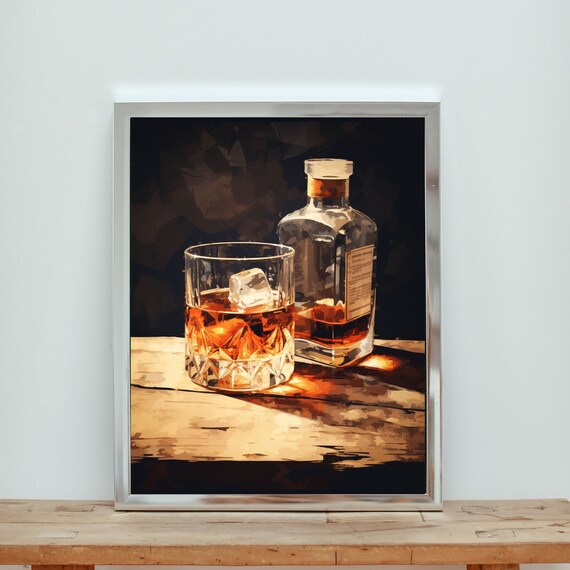Catching the Essence of Scotch Art Via Unique Visual Representations and Styles
The art of whiskey prolongs past the fluid itself, materializing via a variety of aesthetic representations that envelop its storied heritage and workmanship. What stays to be discovered is exactly how these advancing designs show not just the bourbon itself yet likewise the transforming landscape of imaginative analysis. Limited Edition.
The History of Scotch Art

As whiskey manufacturing spread, so too did the wish to raise its experience via art. From the detailed inscriptions on early barrels to the sophisticated labels of modern containers, each component reflects a distinct creative vision, working as a visual story of the bourbon's heritage.
In the 19th and 18th centuries, the increase of the industrial revolution further enhanced whiskey art, bring about cutting-edge packaging and advertising that caught consumer attention. Artists and developers started trying out appearances, imbuing whiskey-related images with symbolic meanings that communicated ideas of neighborhood, craftsmanship, and custom.
Today, bourbon art continues to progress, blending standard methods with modern art kinds. Whiskey Art. This ongoing dialogue between the spirit and its graph emphasizes the long-lasting bond between bourbon and society, enriching the overall experience for enthusiasts worldwide
Iconic Container Layouts
While numerous factors add to the allure of whiskey, legendary bottle styles play an essential role in shaping consumer understanding and improving the general experience. The visual discussion of scotch containers is not simply a visual consideration; it functions as a bridge between the consumer and the item, evoking emotions and establishing expectations.
Distinctive forms, products, and closures can boost a scotch brand's identification, making it quickly well-known on jampacked shelves. For instance, the classic Glenfiddich container, with its classy conical shape, communicates a feeling of tradition and workmanship, while the strong, modern style of the Balvenie bottle mirrors innovation and elegance. Moreover, using tinted glass or one-of-a-kind textures can suggest the quality and personality of the whiskey within.
Famous designs usually incorporate aspects of cultural heritage, signifying the brand's history and connection to its origins. Brands like Jack Daniel's make use of an uncomplicated, robust layout that resonates with its American scotch heritage. Ultimately, the effect of bottle design prolongs beyond mere functionality; it envelops the significance of the brand name, inviting customers to indulge and explore in the abundant tapestry of whiskey society.
Tag Artwork and Branding
Container designs commonly set the phase wherefore customers can expect, but label artwork and branding play an equally considerable duty in communicating a scotch's identity. The tag serves as the initial point of contact between the customer and the product, enveloping the significance of the whiskey within its visual components.
Efficient tag art work combines typography, shade, and imagery to produce a story that resonates with the brand's heritage and target market. A tag including vintage fonts and intricate images may stimulate a sense of tradition and workmanship, appealing to lovers. In comparison, bold colors and modern-day design elements might attract a more youthful market seeking development and exhilaration.


Photography and Visual Narration
Recording the significance of scotch with photography and aesthetic storytelling is an art kind that elevates the brand name experience. This tool transcends simple item representation, delving into the complex narratives that border each container. By using compelling imagery, digital photographers can stimulate emotions that reverberate with consumers, inevitably building a much deeper link to the bourbon brand.
Aesthetic narration in scotch photography often utilizes abundant appearances, illumination, and composition to highlight the special features of the spirit. The interplay of light and darkness can accentuate the brownish-yellow hues of whiskey, while the option of background elements-- such as rustic barrels or stylish glasses-- can strengthen the brand's heritage or way of living organizations.
Moreover, catching the ritualistic elements of bourbon usage, from the pouring to the tasting, welcomes viewers right into a sensory experience, allowing them to envision the tastes and aromas that await. Each photo not just showcases the product yet additionally tells a tale of workmanship, tradition, and the moments that scotch can boost - Realism Art. Therefore, digital photography becomes an effective device in articulating the identification of scotch brand names, positioning them within the wider cultural landscape
Emerging Trends in Whiskey Art
The evolution of scotch art is increasingly formed by modern patterns that show more comprehensive societal changes and consumer preferences. One noticeable pattern is the integration of sustainability into art techniques. Artists are now utilizing green processes and recycled materials to develop whiskey-themed pieces, resonating with environmentally conscious customers. This change not just highlights the relevance of sustainability but likewise enhances the narrative bordering whiskey production.
Additionally, digital art has actually surged official source in popularity, allowing for cutting-edge depictions of scotch. Artists are leveraging modern technology to craft immersive experiences, such as augmented truth setups that involve customers and offer a deeper understanding of scotch's cultural importance. This fad likewise extends to social networks platforms, where visually striking content amasses focus and cultivates community amongst fanatics.
Additionally, collaborations in between scotch brands and artists are becoming a lot more widespread. These partnerships generate limited-edition product packaging layouts and special artworks that celebrate both the craftsmanship of scotch and the creativity of musicians. As bourbon art remains to develop, these arising fads will unquestionably form its future, fostering here are the findings a vibrant crossway of culture, sustainability, and innovation within the bourbon community.
Final Thought
To conclude, the art of whiskey incorporates a diverse range of graphes read review that mirror its rich heritage and workmanship. From legendary container layouts and intricate tag art work to compelling digital photography, each aspect adds to a more comprehensive narrative that boosts the consumer's experience. As arising fads, such as digital art and sustainability, remain to form this imaginative landscape, the multifaceted identity of scotch remains an enduring source of social link and expedition.

In verdict, the art of whiskey includes a diverse selection of aesthetic representations that mirror its rich heritage and craftsmanship.